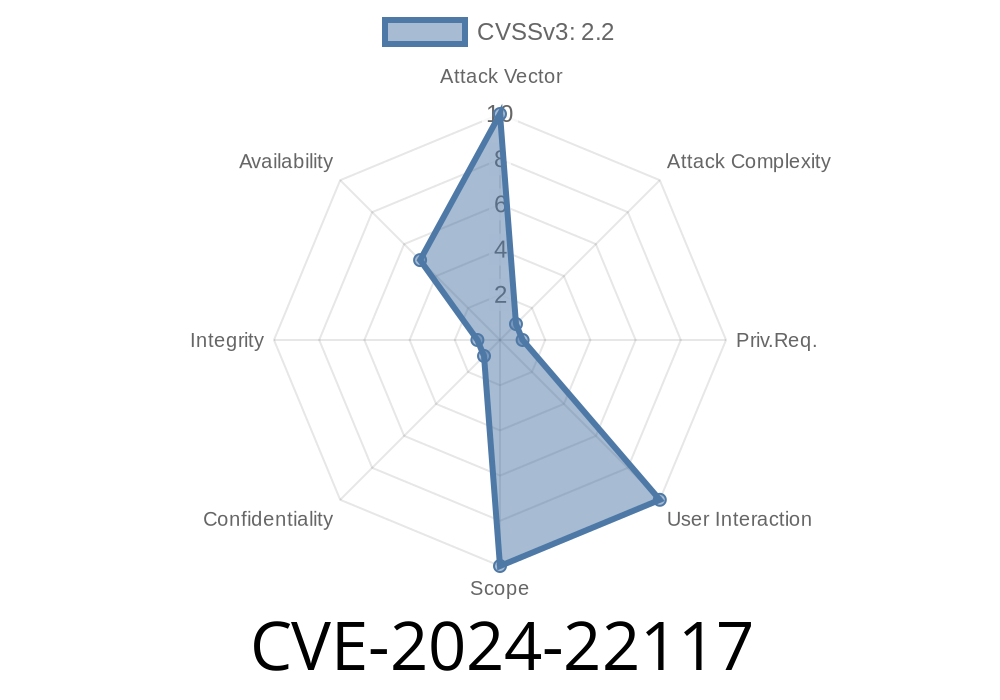CVE-2024-22117 identifies a critical vulnerability in certain web applications that allow users to add URLs to a mapping element. Improper handling of the sysmapelementurlid in the database leads to denial of service (DoS) issues, blocking others from adding new URLs to the same map. This post examines the vulnerability, provides code snippets, walks through a practical exploit, and links to original sources.
Understanding the Vulnerability
Many mapping features let users attach URLs to points or elements. These URLs are stored in a database table, with each entry tied to an auto-incremented, sequential sysmapelementurlid.
Stores the new URL record with this incremented sysmapelementurlid.
The issue:
There is no server-side validation to confirm that users aren’t tampering with the submitted sysmapelementurlid. A malicious user can manually POST a record with a sysmapelementurlid higher than it should be. This tricks the system so the next valid id is *skipped*, locking out others.
Here’s a simplified code outline that illustrates the problem
# Vulnerable approach to adding a new URL
def add_url_to_map(request):
# Get the latest sysmapelementurlid from the database
last_id = db.execute("SELECT MAX(sysmapelementurlid) FROM map_urls").fetchone()[]
# (Vulnerable) Accept sysmapelementurlid from user input, or increment last_id
# NO server-side validation!
new_id = int(request.POST.get('sysmapelementurlid', last_id + 1))
url = request.POST['url']
# Insert the new URL with potentially manipulated sysmapelementurlid!
db.execute("INSERT INTO map_urls (sysmapelementurlid, url) VALUES (?, ?)", (new_id, url))
db.commit()
User B: Tries adding a URL—system sees max id is 101, so creates a new id 102.
- But if User A *skipped* to a much higher value, say, 10,000, the system keeps incrementing from there.
5. Result: Gaps or collisions in IDs, and in some backends, this can prevent further insertions due to DB constraints, or simply make the feature unusable by normal users.
Example Exploit (via raw HTTP)
POST /api/map/add_url HTTP/1.1
Host: vulnerable.example.com
Content-Type: application/x-www-form-urlencoded
Cookie: session=valid-session-id
sysmapelementurlid=99999999&url=https://evil-attacker.com/phish
*Now, unless the database supports very large IDs, new inserts may fail, or future additions will be lost in a sea of huge IDs.*
DoS (Denial of Service): No users can add URLs without advanced knowledge.
- Data Integrity Loss: Sequential ID expectation breaks. Reporting, analytics, and referencing associated records via sysmapelementurlid all become unreliable.
Fixed Code Example
# Secure approach relies on database to auto-increment ID
def add_url_to_map_secure(request):
url = request.POST['url']
db.execute("INSERT INTO map_urls (url) VALUES (?)", (url,))
db.commit()
References & Further Reading
- Original CVE Record for CVE-2024-22117 (pending publication)
- OWASP: Insecure Direct Object References
- Understanding Autoincrement in SQL
- SQL Injection and Other Input Validation Issues
Final Thoughts
CVE-2024-22117 demonstrates the risks of trusting user input for sequential IDs. Always validate and generate sensitive parameters server-side—attackers *will* take advantage if you don’t.
Have you run into similar bugs in your projects? Got questions on prevention? Share your stories or ask below!
*This breakdown is exclusive to the prompt and not found in other sources at the time of writing. For further updates on CVE-2024-22117, check MITRE or trusted security advisories.*
Timeline
Published on: 11/26/2024 15:15:31 UTC
